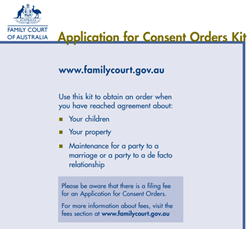There is no doubt that the thought of going to court is scary for most people. You don’t know whether you will get your desired outcome or how much it will cost, or even if it’s necessary.

Answering the question of what you should do if you separate from a long term partner is complex, and dependent on many factors, such as:
Are you in agreement on how you would like to deal with:
i) Children,
ii) Assets and Property,
iii) Custody and Access,
iv) Divorce.
I am a firm believer that if you are able to mutually agree how you will address issues such as Children, Property, Financial payments and a Divorce, then not only will you avoid the need to go to court, you will possibly save yourself a great deal of anxiety, time and money .
Having said that, agreeing on these issues is not the only important thing.
You need to understand your rights and obligations, so that you don’t agree to something which is simply not fair, because you didn’t know better.
So it is important to know your rights, and you can gain this knowledge in a number of ways whether it is through your own research or the advice of a competent, practical lawyer.
When I say practical, I mean, a lawyer you who is:
People often fail to take account of the emotional and financial costs of separation, which is significant in its own right, not to mention the added impact of potential legal proceedings.
For the purposes of this article, we do not intend to discuss the issue of Child Custody, or Child support. The former in particular can be an extremely tricky subject. If the parents cannot reach agreement then it is a complex matter which often requires the intervention of third party mediators, or the court system. In either case, this topic require more detailed exploration.
Having said that, Child Support is a little simpler, and the best place to start is with a phone call to the Child Support Agency, who will provide practical advice. They can get you started in terms of knowing and enforcing your rights and obligations.
There are 4 principal ways you can address the splitting of Financial Assets and Property:
Let’s address each one in turn.
 You can just come to an informal agreement, split your assets and go on your way. Now, this might sound obvious, which it is, but it is very applicable when there is not a lot of complexity in the assets.
You can just come to an informal agreement, split your assets and go on your way. Now, this might sound obvious, which it is, but it is very applicable when there is not a lot of complexity in the assets.
For example, in the case where the assets have mainly been kept separate, and currently exist in individuals (not joint) names. The assets will either be retained by the individual in whose name they exist, or they are easily disposed of and the proceeds of the sale are split by agreement. Clearly, this method comes with minimal effort and/or cost, but depends on simplicity and clear agreement by the parties.
The primary risk with this method is the possibility that one or both parties do not have an appreciation of their rights and obligations, and the agreement is not binding under the Family Law Act (FLA).
What this means, is that it’s possible that having come to an agreement and split the assets, one party may subsequently decide they were not happy and bring a claim under the FLA for a ruling by the court of a different financial split. Generally, parties are required to bring such a claim for Property settlements of spousal Support within 12 months of a divorce, or in the case of a de facto relationship, within 2 years of separation.
So whilst the cheapest is the simplest means of dividing your assets, it does come with some risk.
 One way to create a Binding Agreement is to enter into a BFA. These agreements are recognised under the FLA, and are binding on the parties. To ensure that each party has the best possible means of achieving a just and equitable outcome using these agreements, the FLA requires that each party to the agreement obtains a certificate of independent advice from a Solicitor, who does not act for both parties.
One way to create a Binding Agreement is to enter into a BFA. These agreements are recognised under the FLA, and are binding on the parties. To ensure that each party has the best possible means of achieving a just and equitable outcome using these agreements, the FLA requires that each party to the agreement obtains a certificate of independent advice from a Solicitor, who does not act for both parties.
The purpose of this legal advice is to ensure that parties get some independent advice around their rights and obligations and that they are aware of whether entering the agreement will be to their advantage or disadvantage.
It is also an opportunity to ensure that parties are making decisions have been informed, and without undue influence by one party over the other.
Binding Financial Agreement’s allow parties to come to their own agreement, without the intervention of a 3rd party adjudicator, or going to court. BFA’s also allow Property to be transferred from one party to the other, which will trigger stamp duty exemptions.
This can be extremely important where real estate is being transferred from one party to the other, because in the absence of such an agreement the costs of transfer will be many thousands of dollars
 Method 3 is very similar to method 2 in that the parties reach agreement, without the intervention of the court, either through agreement or mediation. The parties document their agreement via an application for consent orders (usually through separate lawyers) and ask the court to ratify or formalise their agreement. If the court is satisfied that the agreement is just and equitable, it will make a consent order.
Method 3 is very similar to method 2 in that the parties reach agreement, without the intervention of the court, either through agreement or mediation. The parties document their agreement via an application for consent orders (usually through separate lawyers) and ask the court to ratify or formalise their agreement. If the court is satisfied that the agreement is just and equitable, it will make a consent order.
The key advantages in seeking consent orders are, they:
The disadvantages of Consent orders over BFA’s are:
 If parties are unable to reach agreement, and have considered and possibly attempted mediation without success, the only alternative may be to make an application to the Family Court for a Property Settlement.
If parties are unable to reach agreement, and have considered and possibly attempted mediation without success, the only alternative may be to make an application to the Family Court for a Property Settlement.
The court follows this five-step process to determine how property is to be divided between the parties:
Contrary to popular belief there is no assumption that Property will be divided 50/50, and many factors will be taken into account in coming to a decision.
Clearly, this option is the most expensive and is also likely to cause irreparable damage to the relationship going forward. This may be a relevant factor particularly where children are involved and ongoing contact and co-operation is required. However, where the parties are unable or unwilling to reach agreement it may be the only alternative available.
All divorces must be undertaken by application to the Family Law Court. If however, you are making a joint application for divorce and you have made adequate provision for the welfare of children, you are not required to attend court. And subject to your application being correctly completed, a divorce will be granted in your absence.
You are likely to be required to attend court where:
If you file a joint application there is no requirement for service of documents on your partner.
Separation from a long term partner is one of the most challenging things you will ever go through from a financial, emotion and practical perspective.
It’s easy to suggest that if you are able to work in a co-operative fashion then you can minimise the impact of practical matters such as caring for children, handling the financial division of assets and support, and divorce. In reality this is not always possible.
It is possible to avoid the need to go to court , if you can co-operate and reach agreement . If not, the courts are available to assist and provide binding orders to bring about those decisions you are unable to make with your previous partner.
Whether you decide to use the court system or not, it is extremely important that you understand your rights in relation to each of these aspects, and seek legal advice prior to making any decisions you may later regret. Being fully informed and making decisions in the best interest of yourself, the children and possible ongoing relationship with your partner is critical.
Written by Steve Heptonstall BA LLB
Steve Heptonstall – Saxby Munns
BA LLB
 Steve has spent over 20 years working in both private practice as a lawyer and the corporate world in a range of roles ranging from General Counsel to Corporate Executive for a number of large multinationals.
Steve has spent over 20 years working in both private practice as a lawyer and the corporate world in a range of roles ranging from General Counsel to Corporate Executive for a number of large multinationals.
Steve Heptonstall has a wealth of experience assisting clients with Business and Commercial Law matters, Property and Conveyancing, Asset Protection and Estate Planning. Other areas of expertise include Mediation in the area of contract disputes and family law matters such as Binding Financial Agreements.
Steve is a member of the Law Society of NSW.
Last Updated 26 March 2019